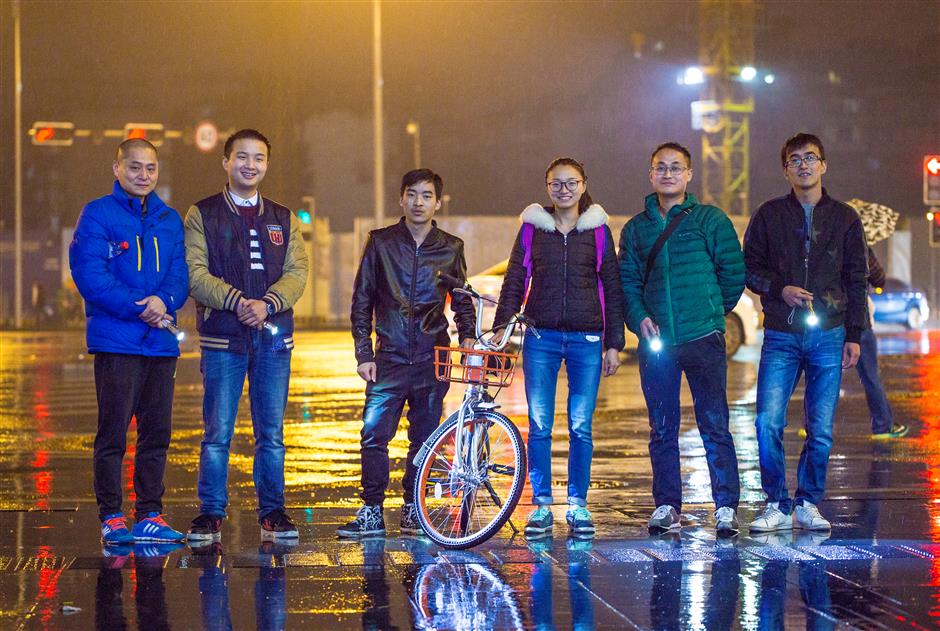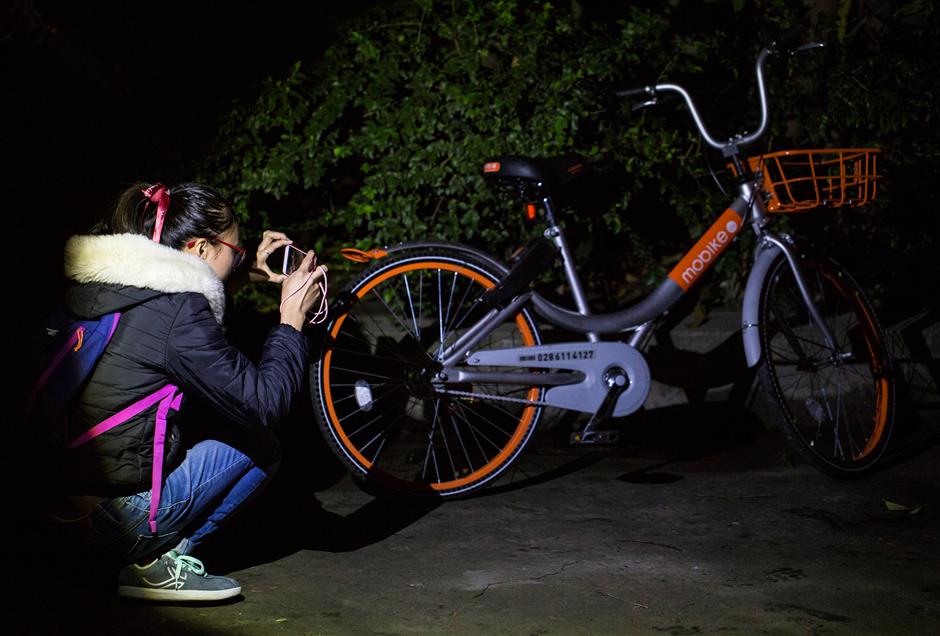Bike hunters target arbitrarily parked shared bikes

A group of bike hunters in Chengdu, Sichuan Province.
By day, Zhao Qi, 23, is an architectural designer in Beijing, but after dark he is a seasoned "hunter" in the concrete jungle. Residential areas are his hunting fields and his smart phone his weapon. Poorly parked shared bikes are his "prey".
On finding shared bikes that have been parked arbitrarily or are blocking traffic, Zhao photos and reports them to the bike-share providers. Then he unlocks the bicycles and pedals them to a nearby public parking area.
Many Chinese bike-sharing companies have started rewarding hunters with credit and punishing violators with higher fees or bans. Previously, Zhao usually corrected the violation at his own expense.
"I don't see the hunting as a job. I do it because I have an interest in it," says Zhao.
About 130 million commuters have been using shared bikes since the industry took off in China's big cities in April 2016. Meanwhile, hunter groups have also spread and number around 100 nationwide.
Hunters come from all walks of life: retirees, housewives, deliverymen, surgeons, IT managers, college students, as well as members of people's congresses.
At first they were fans of Mobike, a leading bike-sharing company. But some are such keen cyclists that they cannot abide violations of the bike-sharing rules.
Hunting addiction
Zhao, who always works to 10 p.m., cycles between his home and the nearest subway station in his daily commute.
His own bikes were repeatedly stolen - then bike-sharing services launched in Beijing in September last year.
He found the dock-less shared bike easy to use: open a mobile app, find the nearest bike and unlock it by scanning the QR code with his smart phone. And it never cost more than 1 yuan per half-hour.
"I registered as a user the first day I saw shared bikes on street," recalls Zhao.
But he was frustrated at the difficulty of finding a bike to get home. The app always led him to a residential area where a lot of shared bikes were parked, "hidden" or even secured with private locks - so he became a hunter.
"Bike sharing is a brilliant idea and I don't want to see it destroyed," he says.
Once he moved a dozen bikes from a private housing area, drawing the attention of security guards and passersby.
"I'm proud that my actions are allowing more people enjoy the convenience of shared bikes," says Zhao.
Many hunters are addicted. Some have reported more than 10,000 bike violation in the past year. They spend hours hunting and thousands of yuan on flashlights, power banks for smart phones and other tools.
"My girlfriend joked that my love of bikes is greater than my love for her," says Zhao.
Many people - especially the blind or disabled - praise hunters for keeping sidewalks clear, but critics say they are meddling in other people's business and accuse them of being bounty hunters for the companies.
Zhao has been arrested by security guards who suspected he was stealing bikes.
"We are not role models. We just want to make the city better," says Zhuang Ji, 42, a pioneer of hunting in Shanghai.

A bike hunter takes a photo of an arbitrarily parked shared bike in Chengdu.
New demand
Now about 70 firms operate more than 16 million bicycles in China and they're gearing up for global expansion. They are credited with helping commuters in congested cities and promoting healthy lifestyles.
According to Beijing transport authorities, bicycles accounted for 63 percent of trips in the 1980s, but that dropped to 17.8 percent in 2014.
A lack of and illegal occupation of bicycle lanes contributed to the trend, say experts.
Zhao says fast bike-sharing services are reinvigorating demand for cycling, which has been overshadowed by "four-wheels worship" in past decades.
Since August, the government has set new guidelines to keep the bike-sharing system on track and avoid random parking. Some cities have built new bicycle lanes and parking areas.
Companies have maintenance workers to move bikes to authorized areas. They are also working on electronic fences and using real-time data to put bikes where they are most needed.
Zhao has mixed feelings about the developments. Sometimes, he is disappointed after a slow night of hunting.
But he concedes: "The final goal of hunters is nothing to hunt."















